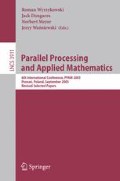Abstract
The present contribution shall illustrate the necessity of planning and optimising resource allocation in a grid. Requirements to be met by a resource management system will be defined. These requirements are comparable with the requirements on planning systems in other fields, e.g. production planning systems. Here, various methods have already been developed for optimised planning. Suitable methods are Evolutionary Algorithms. Based on an example from the field of production planning, the performance of these methods is demonstrated and use in the GORBA resource broker shall be described.
Access this chapter
Tax calculation will be finalised at checkout
Purchases are for personal use only
Preview
Unable to display preview. Download preview PDF.
References
Hovestadt, M., Kao, O., Keller, A., Streit, A.: Scheduling in HPC Resource Management Systems: Queuing vs. Planning. In: Feitelson, D.G., Rudolph, L., Schwiegelshohn, U. (eds.) JSSPP 2003. LNCS, vol. 2862, pp. 1–20. Springer, Heidelberg (2003)
Foster, I., Roy, A., Sander, V.: A Quality of Service Architecture that Combines Reservation and Application Adaption. In: Proc. of the 8th Intern. Workshop on Quality of Service (2000)
Hamscher, V., Schwiegelshohn, U., Streit, A., Yahyapour, R.: Evaluation of Job-Scheduling Strategies for Grid Computing. In: Buyya, R., Baker, M. (eds.) GRID 2000. LNCS, vol. 1971, pp. 191–202. Springer, Heidelberg (2000)
Moreno, R.A.: Job Scheduling and Resource Management Techniques in Dynamic Grid Environments (2002)
Fellows, D.K.: Abstraction of Resource Broker Interface. Deliverable D 2.4a/UoM, University of Manchester (2002)
Buyya, R.: Economic-based Distributed Resource Management and Scheduling for Grid Computing. Dissertation, Monash University, Melbourne, Australia (2002)
Roy, A., Livny, M.: Condor and Preemptive Resume Scheduling. In: Nabrzyski, J., Schopf, J.M., Weglarz, J. (eds.) Grid Resource Management: State of the Art and Future Trends, pp. 135–144. Kluwer Academic Publisher, Dordrecht (2003)
Jakob, W.: HyGLEAM - An Approach to Generally Applicable Hybridization of Evolutionary Algorithms. In: Guervós, J.J.M., Adamidis, P.A., Beyer, H.-G., Fernández-Villacañas, J.-L., Schwefel, H.-P. (eds.) PPSN 2002. LNCS, vol. 2439, pp. 527–536. Springer, Heidelberg (2002)
Jakob, W.: Eine neue Methodik zur Erhöhung der Leistungsfähigkeit Evolutionärer Algorithmen durch die Integration lokaler Suchverfahren. Doctoral thesis, FZKA 6965, University of Karlsruhe (in German) (2004), see also: www.iai.fzk.de/~jakob/HyGLEAM/
Abraham, A., Buyya, R., Nath, B.: Nature’s Heuristics for Scheduling Jobs on Computational Grids. In: Int. Conf. on Advanced Comp. and Communications (2000)
Halstenberg, S., Stucky, K.U., Süß, W.: A grid environment for simulation and optimization and a first implementation of a biomedical application. In: Meersman, R., Tari, Z., Corsaro, A. (eds.) OTM-WS 2004. LNCS, vol. 3292, pp. 59–67. Springer, Heidelberg (2004)
Fischer, L. (ed.): Workflow Handbook (2001) ISBN 0-9703509-0-2
Blume, C.: GLEAM - A System for Intuitive Learning. In: Schwefel, H.-P., Männer, R. (eds.) PPSN 1990. LNCS, vol. 496, pp. 48–54. Springer, Heidelberg (1991)
Blume, C., Jakob, W.: GLEAM - An Evolutionary Algorithm for Planning and Control Based on Evolution Strategy. In: Cantú-Paz, E. (ed.) GECCO - 2002, Late Breaking Papers, pp. 31–38 (2002)
Rosenbrock, H.H.: An Automatic Method for Finding the Greatest or Least Value of a Function. The Computer Journal 3, 175–184 (1960)
Box, M.J.: A New Method of Constrained Optimization and a Comparison with Other Methods. The Computer Journal 8, 42–52 (1965)
Schwefel, H.-P.: Evolution and Optimum Seeking. John Wiley & Sons, New York (1995)
Blume, C., Gerbe, M.: Deutliche Senkung der Produktionskosten durch Optimierung des Ressourceneinsatzes (in German). atp 36, 5/94, 25–29. Oldenbourg Verlag, München (1994)
Author information
Authors and Affiliations
Editor information
Editors and Affiliations
Rights and permissions
Copyright information
© 2006 Springer-Verlag Berlin Heidelberg
About this paper
Cite this paper
Jakob, W., Quinte, A., Stucky, KU., Süß, W. (2006). Optimised Scheduling of Grid Resources Using Hybrid Evolutionary Algorithms. In: Wyrzykowski, R., Dongarra, J., Meyer, N., Waśniewski, J. (eds) Parallel Processing and Applied Mathematics. PPAM 2005. Lecture Notes in Computer Science, vol 3911. Springer, Berlin, Heidelberg. https://doi.org/10.1007/11752578_49
Download citation
DOI: https://doi.org/10.1007/11752578_49
Publisher Name: Springer, Berlin, Heidelberg
Print ISBN: 978-3-540-34141-3
Online ISBN: 978-3-540-34142-0
eBook Packages: Computer ScienceComputer Science (R0)

